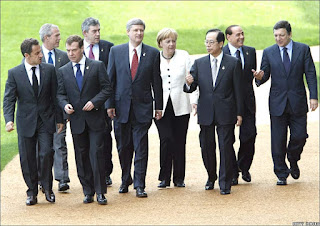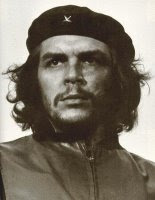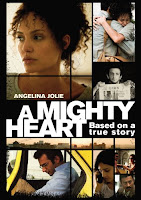
THE FILM BY YANN ARTHUS-BERTRAND
(click above)
Uniting people from every niche of the globe to reflect on the cultural, social & environmental issues affecting our world today
A new documentary, FLOW, discusses the growing privatization of the world's dwindling fresh water supply and how these handful of water corporations spend millions a year in marketing to convince us that bottled water is better than tap water.
Opening in New York and Los Angeles on Sept. 12.
This speech was given on July 17, 2008 at the D.A.R. Constitutional Hall.
 Photo: The G8 Leaders: France’s Nicolas Sarkozy, America’s George W Bush, Russia’s Dmitry Medvedev, Britain’s Gordon Brown, Canada’s Stephen Harper, Germany’s Angela Merkel, Japan’s Yasuo Fukuda and Italy’s Silvio Berlusconi are joined by European Commission President Jose Manuel Barroso.
Photo: The G8 Leaders: France’s Nicolas Sarkozy, America’s George W Bush, Russia’s Dmitry Medvedev, Britain’s Gordon Brown, Canada’s Stephen Harper, Germany’s Angela Merkel, Japan’s Yasuo Fukuda and Italy’s Silvio Berlusconi are joined by European Commission President Jose Manuel Barroso.The G8 Summit held a meeting this week to tackle the global issue of climate change. The pathetic result only aimed for a change to be made by 2050, by cutting 50% of carbon emmisions (at current levels.)
There seems to be a standoff between the G8 and developing nations like China and India. China and India have not wanted to step-up and make any commitments to lowering carbon emissions. Bush's reaction: if they don't lower carbon emissions then why should we? Answer: because the earth is at stake and if we want our children to live in a sustainable earth tommorrow changes need to be made today. Plus, Bush has even refused to set any interim targets before 2050. Therefore no goals will be met until most of those leaders either die or live until they are 100 and something years old.
The G8 leaders reaction to China and India (and especially Bush because our country holds the most carbon emissions per capita,) should have been, "We'll assist you to move to a pattern of development which is sustainable, low in terms of emissions intensity. But we as the richest nations are willing to take the lead and we affirm our commitment to do so and we expect you to follow suit."
I am very dissapointed at their hesitance in inititating any real targets to lowering carbon emissions, but I have been shocked by Bush and China's "I won't do it, if you don't do it" child-like attitude. Neither of them wants to take the lead and come the first initiative. Soon enough their this world into one big unsolvable mess that our children or grandchildren will have to clean up, if it's not already too late.
What would the world be like if it were scaled down to only 100 people? Watch and see
The resounding theme to me is how I should share as much as I can with those less fortunate.
What reaction did you have?
This week the well-awaited film, "If The Oil Runs Out," has been released by BBC's IF series. This docu-drama (documentary drama) documents what experts fear will come true when cheap oil we depend on starts to run out. We may not be able to take anything for granted anymore. If you want to see what can happen when global demand for oil rises and supply is running out, watch this movie.
Part 2 -http://www.youtube.com/watch?v=AXeXxWSgT_o
Part 3 - http://www.youtube.com/watch?v=nBL8sx7BS5Y
Part 4 -http://www.youtube.com/watch?v=HVG4ID-PxMc

 Dunkin Dounuts pulls commercial featuring Rachel Ray wearing a scarf that looks to Arab after Michelle Malkin, right-wing Blogger, and other conservatives complained the scarf looked too much like a keffiyeh, what Malkin describes as, "the traditional scarf of Arab men that has come to symbolize murderous Palestinian jihad."
Dunkin Dounuts pulls commercial featuring Rachel Ray wearing a scarf that looks to Arab after Michelle Malkin, right-wing Blogger, and other conservatives complained the scarf looked too much like a keffiyeh, what Malkin describes as, "the traditional scarf of Arab men that has come to symbolize murderous Palestinian jihad."
 And how about Timothy McVeigh, the American terrorist responsible for the Oklahoma bombing. He wore Denim Jeans! Are jeans going to now symbolize "American terrorist sympathizer?" Jeans are just as common in my country as the keffiyeh is in the middle-east.
And how about Timothy McVeigh, the American terrorist responsible for the Oklahoma bombing. He wore Denim Jeans! Are jeans going to now symbolize "American terrorist sympathizer?" Jeans are just as common in my country as the keffiyeh is in the middle-east. 
 Me, wearing my keffiyeh in Petra, Jordan one of the seven man-made wonders of the world.
Me, wearing my keffiyeh in Petra, Jordan one of the seven man-made wonders of the world.
Want to watch some entertaining videos at home tonight? Well, here are some watch-worthy videos of absolutely remarkable women sharing some (often funny!) stories. Enjoy!
This latina, award-winning writer and captivating story-teller, Isabel Allende, discusses Tales of Passions.
Queen Rania at Google's Zeitgeist conference discussing using technology (like this blog) as a tool for cross-cultural connectivity.
Here is a great report on North Korea to better understand the most isolated country in the world.
North Korea was always a great mystery to me until I watched this fantastic report by Christiane Amanpour on CNN world, in my madrid hotel room.
